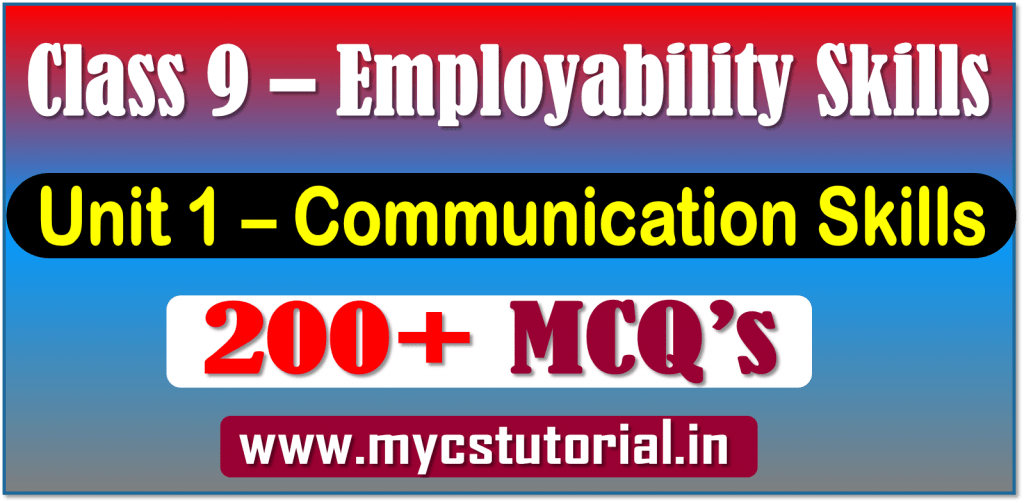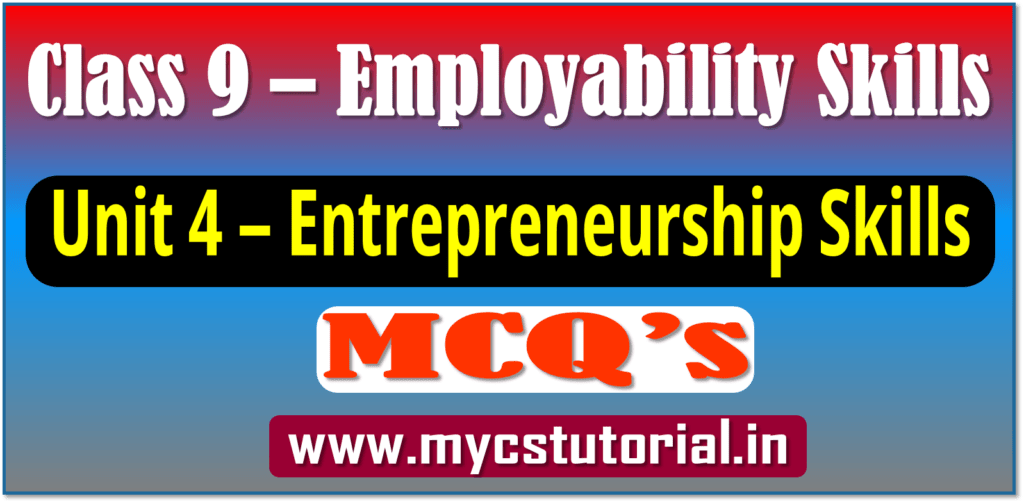50+ Questions with Answer
Unit 4 Entrepreneurship Skills
1. Who is entrepreneur?
Answer : An entrepreneur is a person who is self-employed, is willing to take a calculated risk and brings in a new idea to start a business.
2. Is self-employed like shopkeeper can be entrepreneur?
Answer : No, Self-employed persons are not entrepreneurs, for example, a shopkeeper cannot be called an entrepreneur unless he/she introduces a new method or idea in the business.
3. What is Enterprise?
Answer : An enterprise is a project or undertaking that is bold and fulfills a need of the society which no one has ever addressed.
The business set up by an entrepreneur is called an Enterprise.
4. Which steps you need to follow to become successful entrepreneur?
Answer : To become a successful entrepreneur you need to follow these steps:-
(i) Identify needs
(ii) Recognising Opporunity
(iii) Idea and Start of a business
(iv) Growing the business
5. What is startup?
Answer : A business or a company is called startup when it is in its initial phase of development i.e. when the focus is on developing the product to make it fit for market.
6. What is Entrepreneurship?
Answer : The process of developing a business plan, launching and running a business using innovation to meet customer needs and to make a profit is entrepreneurship.
7. What is Business?
Answer : Business refers to the commercial activity which is based on an old concept, whose path is relatively tested and there is a low risk involved.
or
A business is defined as a continuous activity, where economic actions are taken by humans with the objective of earning a profit by either producing, sourcing, buying and selling of goods and services.
8. When a strat-up company becomes the business?
Answer : An entrepreneurship venture initially is called a satrtup company, and when established it is termed as an enterprise which may later become a business.
9. How a business can be categorised?
Answer : A business can be categorised in several ways –
(a) On the basis of Economic Activity, business are categorised – Manufacturing, service and trading.
(b) Based on size, businesses are categorized into micro, small scale, medium scale and large scale.
(c) Based on business model, they might be categorized differently.
(d) Based on legal form, they have to follow different procedures and norms and thus are categorized differently.
10. What are the features of a Business?
Answer : Irrespective of nature, size, scale or ownership, businesses have some common features:
(a) Most businesses are trade – based, i.e. purchase and sale of goods.
(b) Businesses have main objective to earn profit. However some businesses have the motive of social welfare.
(c) In every business, there is a person, who can take final decision.
(d) A business must be doing and dealing in transactions on a regular basis.
(e) Every business is featured with uncertainty of sales, return and success.
11. Define a Business entity.
Answer : A business entity is defined as an enterprise or organization that uses economic inputs or resources, converts them into goods or services and provides them to its customers in exchange for money.
12. What are the different types of Business?
Answer : Business can be categorised into five category :-
(A) Manufacturing Business
(B) Service Business
(C) Merchandising Business
(D) Trading Business
(E) Hybrid Business
13. What is Manufacturing Business?
Answer : A business, which used the raw materials to convert it into the end product, called Manufacturing Business. e.g manufacturing and selling of shoes, clothes, mobile phones, laptops, suitcases, metal products, etc.
14. What is Service Business?
Answer : A service business is involved into provision of intangible offering, i.e. a service that does not have a physical form but provides value to the customer.
Services businesses offer value using skills, consultancy, expertise, efficiency etc.
15. Give example of five service business.
Answer : Banking, Law firms, Charted Accountants, Education, School, Coaching, mycstutorial.in, Beauty Salons, etc.
16. Give example of five Manufacturing business.
Answer : Cloths, Mobile Phones, Laptop, Suitcase, Metal, Utensil, etc.
17. What do you mean by Merchandising business?
Answer : A business in which products are bought at a wholesale price and sold at retail price. It involves the transfer of ownership or tangible products.
18. Give example of Merchandising business.
Answer : Resellers, Distributors, Grocery Store, Supermarkets, Retail Clothing Stores, Convenience stores, etc.
19. What do you mean by Trading Business?
Answer : A business in which reselling of goods are done, called Trading Business. In this business, reseller does not purchase the goods like merchandising business, they earn as middlemen.
Trading business earns money from the profit margin purchase cost and selling price. Import and export of goods and services largely make up the trading sector.
20. Give example of Trading business.
Answer : Real estate brokers, middlemen, importers, exporters, foreign exchange traders etc.
21. What do you mean by Hybrid Business?
Answer : Hybrid businesses are some businesses that are involved in different activities ranging from manufacturing, service, merchandising etc.
Hybrid businesses are some businesses that are involved in different activities ranging from manufacturing, service, merchandising etc.
22. How a Traditional Restaurant Service Business convert in to a Hybrid business?
Answer : Traditional restaurant business is classified as a service business, some are also considered to be hybrid businesses.
If they are involved in combining ingredients to make different products, they are performing a manufacturing activity.
If they are involved reselling of alcoholic items, it can be considered to be involved in merchandising.
Similarly, it also provides the service of fulfilling customer orders. Hence, it can be categorized as a hybrid business.
23. How many types of Businesses in our community on the basis of Size?
Answer : On the basis of size, there are three types of business enterprises. These are:-
(a) Micro Enterprise,
(b) Small Enterprise
(c) Medium Enterprise
24. How many types of Businesses in our community on the basis of legal form?
Answer : On the legal form, there are five types of business.
These are:-
(i) Sole proprietorship,
(ii) One person Company
(iii) Partnership
(iv) Limited Liability Partnership
(v) Company
25. What is Micro Enterprise?
Answer : A micro enterprise is a business enterprise where the investment in plant and machinery or equipment is not more than INR 1 crore and turnover does not exceed INR 5 crores.
26. What is Small Enterprise?
Answer : A small enterprise is a business enterprise where the investment in plant and machinery or equipment is not more than INR 10 crore and turnover does not exceed INR 50 crores.
27. What is Medium Enterprise?
Answer : A medium enterprise is a business enterprise where the investment in plant and machinery or equipment is not more than INR 50 crore and turnover does not exceed INR 250 crores.
28. What is Sole proprietorship?
Answer : In a sole proprietorship, the ownership and control of the business is with one single person, and the liability of the owner is not separate from the entity.
29. What is One Person Company?
Answer : A One Person company also has only one person as a member, who acts in the capacity of both, a shareholder and a director, but an OPC is legally separate from its owners.
There is no threat on the owner’s personal property in case of unmet liabilities.
30. What is One Person Company?
Answer : Partnership is a legal form, where at least two people, or more start a business as co-founders or co-owners and divide the share as per agreement.
The partners are personally liable for an unlimited amount of liabilities.
31. What is Limited Liability Partnership Company?
Answer : In a Limited Liability Partnership, there are two or more partners.
In this, no one single partner or owner is individually responsible for any other partner’s or member’s negligence or misconduct or liability.
32. What is Company?
Answer : A company is defined as a legal entity formed to get engaged in business, by a group of individuals. Usually, these individuals have limited liability, and the capital in units of equal value of a company are called ‘shares’.
Company can be public or private.
33. How many types of Businesses in our community on the basis of Sector ?
Answer : On the basis of Sector, there are three types of company. These are –
(a) Primary Sector
(b) Secondary Sector
(c) Tertiary Sector
34. What is Primary Sector Company?
Answer : Primary sector company includes businesses that involve extraction, retrieval, harvest and production of raw materials using natural products from the earth.
For example, some raw materials include coal, wood, grains, iron, corn etc.
Thus, some primary sectors include mining, agriculture, fishing, horticulture etc.
35. What is Secondary Sector Company?
Answer : Secondary sector company includes businesses that involve in transformation of raw materials into finished goods.
It takes products from primary sector and organizes all factors of production to make utility as well as luxury products.
35. What is Tertiary Sector Company?
Answer : Tertiary sector is defined by provision of services to businesses and customers.
It is completely based on a service and there is no production of goods involved.
By Anjeev Kr Singh – Computer Science Educator
Published on : December 23, 2021 | Updated on : June 30, 2023









